If Pandit Jawaharlal Nehru comes back from the dead today, he would be both horrified and amused. He would be horrified to learn that many in India believe he was at best a softie and at worst a nincompoop who lost part of Kashmir, misruled India, and prevented it from developing into a great power by his socialist and secularist politics. He would be amused to see that the demagogue reviling him with gusto is actually replicating most, if not all, of his policy trajectories regarding Kashmir and India’s Muslim minority.
Even in Pakistan, some gullible people curse Modi and then sing praises of the Indian National Congress and Jawaharlal Nehru. Nehru is lauded as a liberal, a secularist, a socialist, a humanitarian, etc. These people, of course, have never experienced a thing known as the objective study of history. Modi himself lambasts Nehru a lot but then when have demagogues uttered the truth? Modi wants to snatch votes away from Nehru’s progeny so it isn’t in his interest to say that his revocation of Article 370 was just the latest part of a long sequence of steps by Indian leaders to rob Kashmiris of their right to self-determination.
Nehru’s Kashmir Policy: A Historical Perspective
Few remember today that Article 370 was itself illegal and was only used as a tool in Nehru’s plan to annex Kashmir to India.
Nehru’s Kashmir policy alone suffices to sufficiently establish the fact, as Quaid-e-Azam had publicly declared, that Nehru was a leader of the Hindu Congress bent on ensuring Hindu supremacy in the subcontinent.
Jawaharlal Nehru’s devious designs about Kashmir were apparent even before the partition. He toured Kashmir multiple times in an effort to prop his stooge, Sheikh Abdullah. Indian journalist M. J. Akbar has reported in his book, “Behind the Vale”, that it was Nehru who persuaded Mountbatten during their private meetings to give Gurdaspur to India so that India could have a direct land link to Kashmir.
After the partition, Nehru ordered work on the Pathankot-Kathua road to begin at break-neck speed in order to make that road fit for military transport as soon as possible. This move was observed by the Pakistani authorities and on the 10th of October 1947, Colonel Sher Khan, deputy director Military Intelligence (MI), wrote a report for GHQ and the Defence Ministry in which he predicted that Pathankot Kathua road would be fit for military transport by late October. He predicted that only then would the accession by Maharaja Hari Singh to India occur.
Nehru, an intelligent man, knew that he could only get Muslim-majority Kashmir by force. So, he duly began the preparations for an invasion long before the excuse of the “tribal invasion” was found. After all, it takes no more than a minute to find an excuse by an aggressor for an invasion but it takes much longer to complete the military preparations.
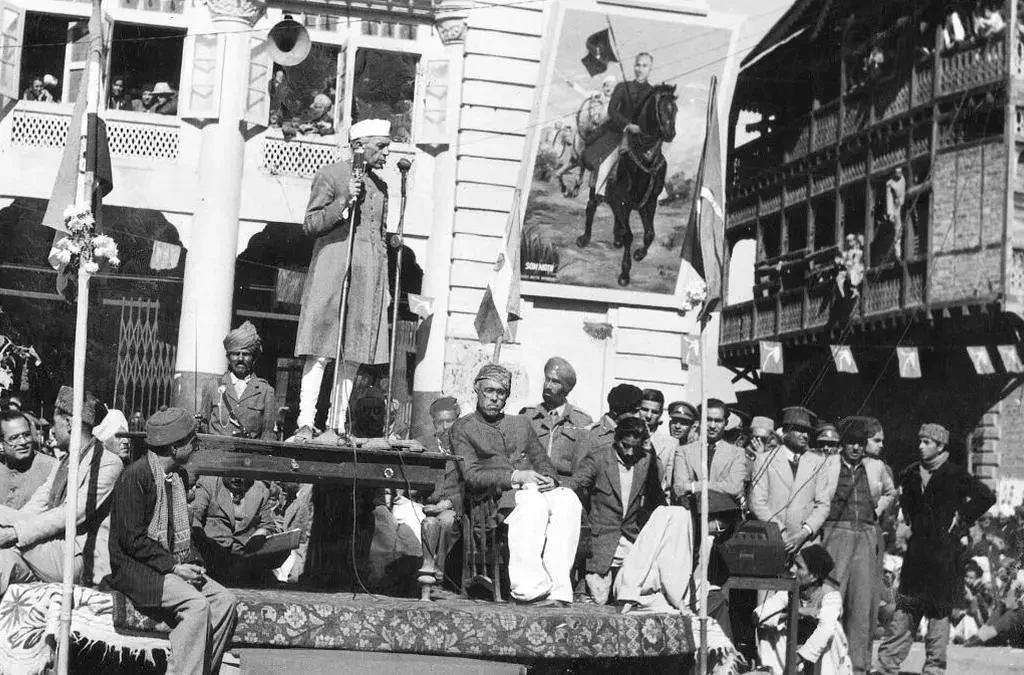
The Accession
The “accession” of Kashmir to India and the subsequent Indian invasion of Kashmir is another interesting story. Nehru had sent his confidant Krishna Menon to pressurize Maharaja Hari Singh to accede to India promptly but Hari Singh was dallying as he knew that after accession Kashmir would be ruled by Nehru through his stooge Sheikh Abdullah and he would be displaced. When the Maharaja decided to flee Srinagar on the 26th of October after the conquest of Baramulla by the Azad Kashmiri forces and tribal volunteers, Menon accompanied him on the 16-hour-long road trip to Jammu.
During this journey, Menon put a lot of pressure on Hari Singh and finally got him to agree to sign an Instrument of Accession. Upon reaching Jammu in the evening, Menon immediately traveled to Delhi and, after conferring with Nehru, came back on 27 October when he gave the instrument of accession to Hari Singh who signed it.
An interesting fact related to the “accession” of Kashmir is that many hours prior to Hari Singh’s signing of the Instrument of Accession, Indian troops of the First Sikh Regiment had landed at the Srinagar airport.
Colonel Dewan Ranjit Rai, the commander of the regiment, had immediately launched an unsuccessful attack on the Azad forces on the Baramulla-Srinagar road and had been killed in battle. So, the Indian invasion of Kashmir by Nehru’s troops had begun many hours before even the sham instrument of accession was signed! Nehru later blatantly lied about the accession episode because he knew that India’s whole case was based on an instrument of accession that was illegal.

Nehru’s Approach to Muslims
An “accusation” oft-repeated by Modi’s followers is that Nehru was “soft” on Muslims. Without going into the details of hundreds of anti-Muslim riots and systematic efforts by Nehru to remove Muslims from influential positions in both public and private sectors, let’s recall an event that is sufficient to prove this “allegation” wrong: The Jammu Genocide.
The horrific genocidal massacres of Muslims had begun under Hari Singh’s direction in October 1947. But after 27 October, it was Nehru and his Indian army who were calling the shots in Kashmir. Like the “despot” Hari Singh, the “secular humanist” Nehru made no effort to stop this genocide which continued with full fury until the Jammu, Udhampur, Samba, and Kathua districts of Jammu division were almost completely emptied of Muslims.
According to scholars Ian Copeland and Christopher Snedden 70-80,000 Muslims were killed and 200000-250000 were pushed into Pakistan as refugees. The “secular humanist” Nehru sanctioned this genocide to “secure” the Pathankot-Jammu-Srinagar road which was vital for the supply of invading Indian forces.
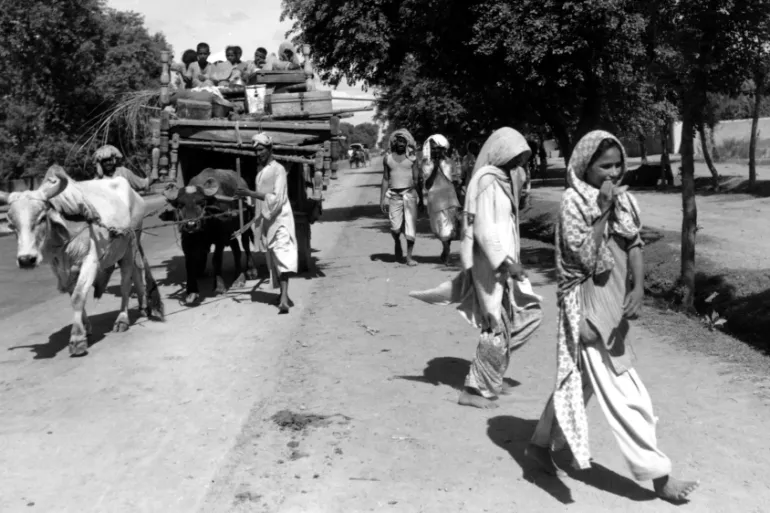
In an attempt to gain global support for his invasion, Nehru approached the UN regarding the Kashmir issue. Hindutva zealots criticize Nehru to this day for this step but at that time Nehru thought it would be easy for him to fool the international community with the instrument of accession. He wanted to get the freedom fighters of Azad Kashmir forces and Pakistan labeled as aggressors by the international community. In order to gain global goodwill, he also promised to hold a plebiscite in Kashmir as soon as “peace” was restored. He never meant to honor that commitment, however. His subsequent behavior proves that this pledge of plebiscite was just another deception laid by the wily Nehru.
UN Mediation and Broken Promises
The UN made many efforts to solve the Kashmir issue. All of these efforts failed due to the stubbornness of one man: Jawaharlal Nehru. Sir Owen Dixon, who formulated a very reasonable and realistic plan for solving the Kashmir issue, squarely blamed the Indian government headed by Nehru for the failure of his efforts. In his report to the UN Security Council, he declared: “In the end I became convinced that India’s agreement would never be obtained to demilitarization in any such form or to provisions governing the period of the plebiscite of any such character, as would in my opinion permit of the plebiscite being conducted in conditions sufficiently guarding against intimidation and other forms of influence and abuse by which the freedom and fairness of the plebiscite the might be imperiled.”
After Dixon, Dr. Frank Graham was appointed to the post of UN mediator on Kashmir. He proposed 6 formulae over the years. All were accepted by Pakistan and rejected by India. This was done despite the fact that Nehru continued to declare repeatedly that India was committed to holding a plebiscite in Kashmir. For example, in a speech in Srinagar on the 4th of June, 1951, he said, “I want to repeat that the Government of India will stand by that pledge, whatever happens. That pledge itself stated that it is for the people of Kashmir to decide their fate without external interference. That assurance also remains and shall continue.”
From 1947 to 1954, Nehru repeated his promise of holding a plebiscite dozens of times without ever having any intention to do so. Even a seasoned liar like Narendra Modi can take some lessons here.
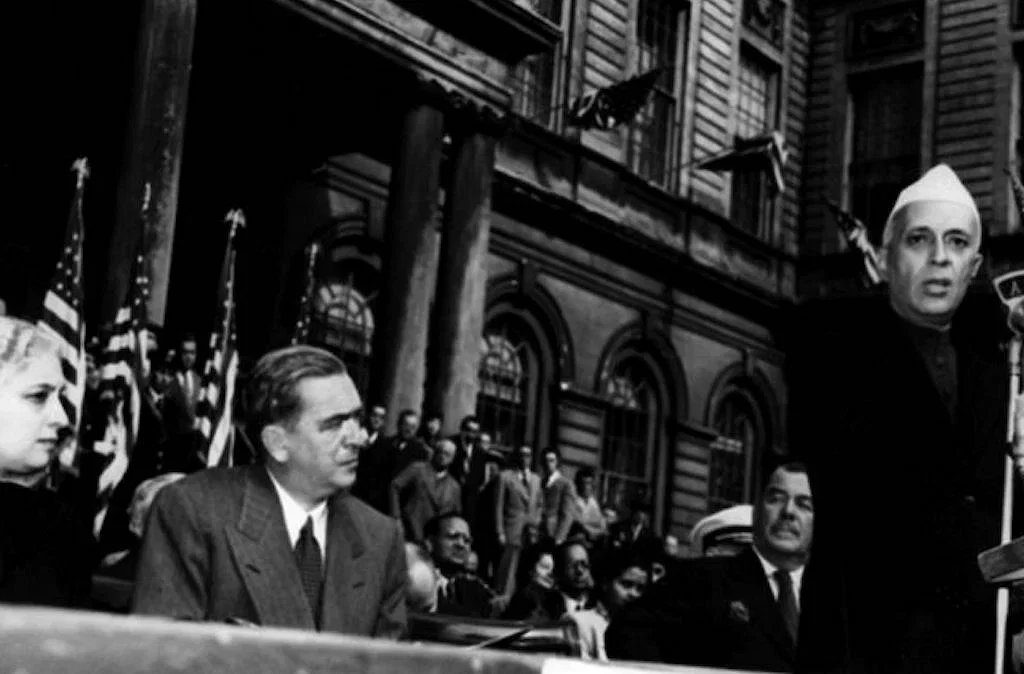
Nehru’s Rule in Kashmir
On the 17th of October, 1949, the Indian Constituent Assembly adopted Article 370. It conferred “special” status on Jammu and Kashmir and allowed it to have a separate flag and constitution. It also limited Indian jurisdiction to defence, foreign affairs, and communications. Basically, it replicated the relationship between the Kashmir state and the British government before partition. Nehru knew that a restive region like Kashmir could only be completely subjugated in stages. An attempt to outrightly annex Kashmir could have led to a fierce revolt. Nehru also had to keep in mind the international community which could have reacted negatively to such a step.
However, like the plebiscite pledge, Nehru never meant to honor Kashmir’s “special status”. In practice, the Indian army ruled Kashmir under Nehru’s direction. In September-October 1951 sham elections were conducted by the “democrat” Nehru, and all 75 seats were won by Nehru’s stooge Sheikh Abdullah’s National Conference. After “winning” the election, Sheikh Abdullah started entertaining the delusion that as “Prime Minister” of “autonomous” Kashmir, he didn’t need to follow Nehru’s dictates anymore. Sheikh Abdullah’s delusions were rudely shattered by the “democrat” Nehru when in 1953, Sheikh Abdullah was unceremoniously removed and thrown in jail. Nehru kept Sheikh Abdullah in jail for 11 years and appointed an illiterate goon Bakhshi Ghulam Mohammad as the Prime Minister of Kashmir. Unlike Abdullah, Bakhshi had zero popularity and legitimacy in Kashmir and he did Nehru’s bidding with complete servility.
Afterreplacing Abdullah with Bakhshi, Nehru finally felt secure enough to abandon repeating his deceptive pledge about holding a plebiscite in Kashmir. Thereafter, he refused to take any UN plans for a solution to the Kashmir issue seriously. He refused to negotiate with Pakistan on this matter as well. Only when India was humiliatingly defeated by China in the Sino-Indian War did Nehru agree to US President Kennedy’s suggestion that he negotiate with Pakistan regarding Kashmir. Nehru’s agreement was only given in order to receive a massive amount of US civil and military aid.
Having achieved this goal, Nehru refused to allow any meaningful progress toward the solution of Kashmir issue. When the old wily politician died in 1964, he must have been quite content with his iron grip on Kashmir.
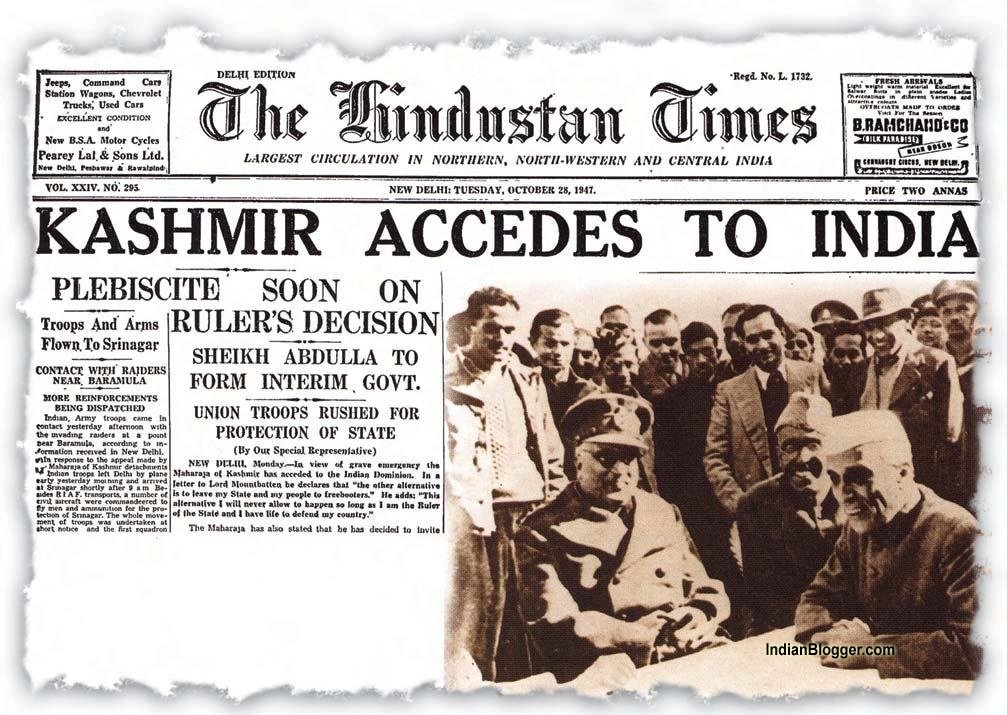
Legacy and Continuation: From Nehru to Modi
As for Kashmir’s “special status”, it was never respected in spirit.
It was continuously eroded by Nehru and was practically scrapped by his daughter in 1975 when she signed the Indira-Sheikh accord with Sheikh Abdullah (who had learned his lesson after his long imprisonment). Kashmir was torn apart by Nehru and Indira’s successors in Congress with massacres and mass rapes in the 1990s as well. So, when Modi scrapped Article 370, it was the continuation of the Indian policy of Kashmir’s subjugation inaugurated by none other than the secular socialist Nehru!
In conclusion, an appeal is made to the Indians, particularly the Hindutva enthusiasts, to accord Nehru the rightful recognition as a “hero” in “their history.” The man schemed with the British Governor General, invaded another country, facilitated a genocide, “cleansed” Jammu, lied through his teeth, fooled the international community, chained Kashmir, and managed to ally himself with both superpowers of the day while tyrannizing Muslims in Kashmir and India. Modi hasn’t “accomplished” even 10% of this “impressive” curriculum vitae! Similarly, those simping for Nehru and his progeny in Pakistan need to understand why Quaid-e-Azam called his Congress and his rule as Hindu Congress and Hindu Raj! BJP and Congress might differ on their internal (i.e. Hindu) issues, but when it comes to Muslims, Kashmir, and Pakistan, their policy has been quite in sync and institutionalized. If we want to defend ourselves from the enemy, understanding all his visages is a must!

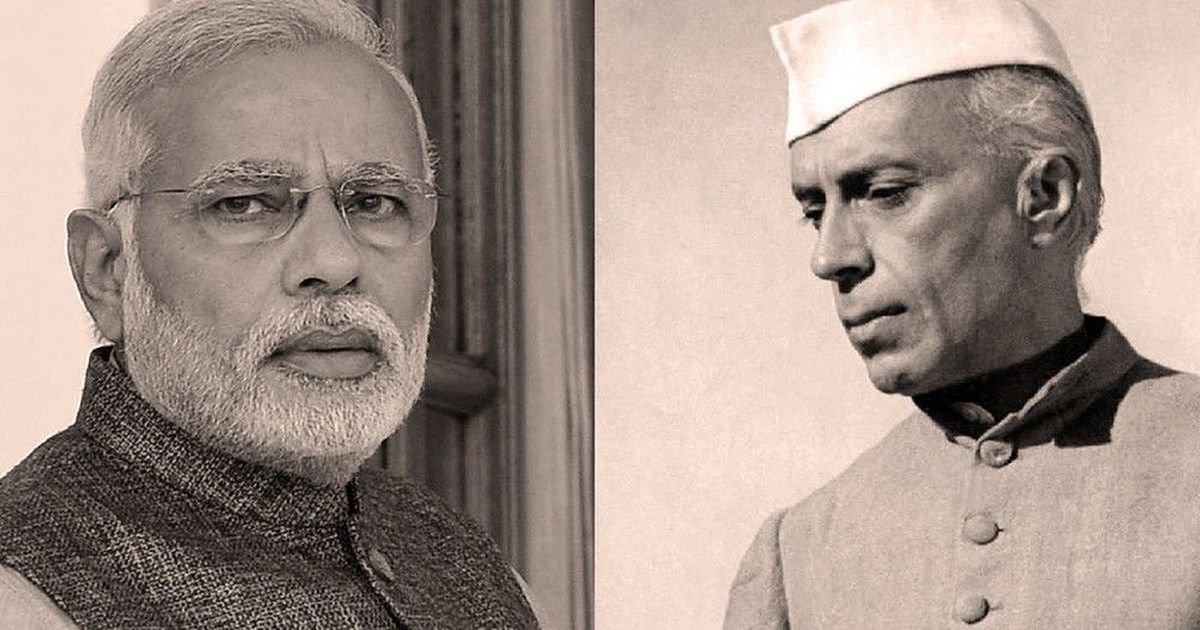

![Ukrainian and Russian flags with soldier silhouettes representing ongoing conflict. [Image via Atlantic Council].](https://southasiatimes.org/wp-content/uploads/2026/02/2022-02-09T000000Z_1319661209_MT1NURPHO000HXCNME_RTRMADP_3_UKRAINE-CONFLICT-STOCK-PICTURES-scaled-e1661353077377.jpg)


